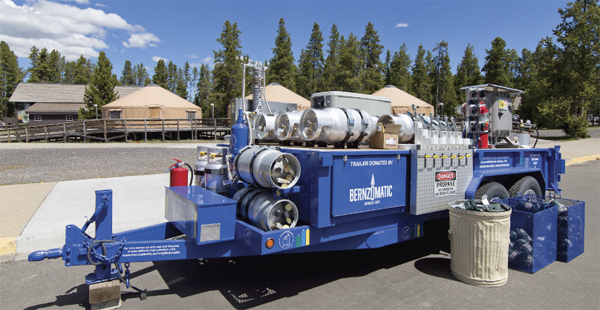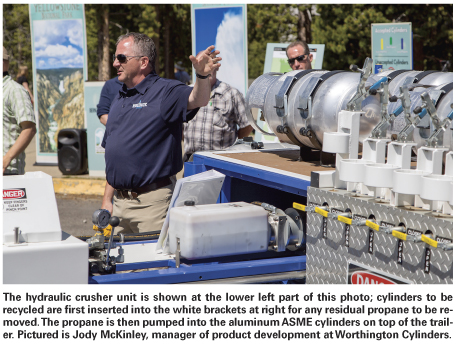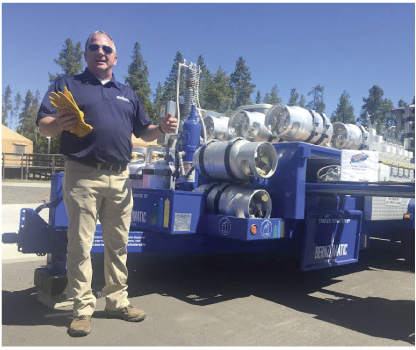Tuesday, July 19, 2016
The Yellowstone Park Foundation and Bernzomatic, a hand-held torch and fuel cylinder company, launched a disposable camping fuel cylinder recycling program for Yellowstone and Grand Teton National Parks. The program aims to help park visitors properly recycle propane containers commonly used to fuel lanterns, camping stoves, and grills. The Foundation notes that the containers are usually either left at campsites or placed in improper recycling containers. This recently introduced sustainability initiative includes the rollout of a new recycling vehicle, which park officials showed off at a special event on June 4, 2016. 
The Foundation notes that the sustainability initiative and the recycling vehicle “set [a] new industry standard for protecting natural resources and reducing waste in U.S. parks.”
This program aims to solve an environmental challenge facing Yellowstone: many of the park’s millions of annual visitors use propane cylinders in camping stoves and grills during their stay but often don’t know how to properly dispose of the containers. Visitors tend to leave them near campsites or in the incorrect recycling containers, rather than properly disposing them in designated propane recycling bins.
“Proper recycling of all camping materials — including the fuel cylinders used each season — has always been a focus at Yellowstone; however, the park’s original infrastructure could not keep up with the number of cylinders used,” said Karen Kress, president of the Yellowstone Park Foundation. “We are grateful for Bernzomatic’s partnership in uncovering a long-term cylinder recycling solution that also makes the process simpler for park visitors.”
As part of the program, Bernzomatic invested significant resources to overhaul Yellowstone’s existing cylinder reclamation vehicle. The company’s engineering, product development, safety, and regulatory teams collaborated to create this first-of-its-kind design with enhanced safety features. The new vehicle now removes residual propane from discarded fuel cylinders and processes them for recycling 20 times faster than the original vehicle.
“This partnership is a natural extension of our Bernzomatic CylinderSafe program, the first and only public education program on non-refillable fuel cylinder safety,” said Mike Verne, general manager of consumer products for Worthington Industries, parent company to Bernzomatic. “Through this initiative with Yellowstone, we want to make it as simple as possible for park visitors to access important cylinder safety and disposal information and reduce waste in the parks.”
To make the recycling process simpler, Yellowstone and Bernzomatic are also renovating the park’s propane recycling bin infrastructure by making the bins more easily identifiable, distinguishable, and uniform in color. The recycling bins will have updated signage that clearly communicates the type of cylinders that are acceptable to discard in the bins. The organizations are also working to educate park visitors about cylinder recycling by sharing program information on their websites and social channels and across park lodges, visitor centers, and local convenience stores.
To find out more details about the program, BPN contacted Verne with some additional questions:
BPN: Can you provide more history on how and why the program came about?
Verne: In 2005, Yellowstone became the first national park to recycle small propane cylinders. Since then, the park collected, crushed, and redeemed an average of 16,300 cylinders per year from the greater Yellowstone area; however, Yellowstone was not able to keep up with demand or meet safety requirements with the original propane recycling machine [it] had in place. Yellowstone recently contacted Bernzomatic to rebuild the propane recycling machine to improve efficiency in time for the park’s peak visitor season in 2016 in order to maintain the park’s natural beauty and protect its employees and wildlife.
BPN: Can you provide more detail on how the process works and how the machine removes the residual propane from the cylinders and processes them 20 times faster than the original unit?
Verne: The previous vehicle required upwards of 30 minutes to remove residual propane from one cylinder; the new recycling vehicle can remove residual propane from one cylinder in approximately one minute. The new recycling vehicle only requires one individual to operate; whereas the previous vehicle required multiple individuals.
How the process works:
• The recycling process begins by removing residual propane from each cylinder so it can safely be crushed.
• Once residual propane has been removed, an operations staff member places the empty cylinder in the compactor to be crushed.
• Yellowstone will then be able to sell the scrap metal to recycling locations.
• Yellowstone will also be able to recycle and use the remaining propane for propane-powered equipment throughout the park.
BPN: Can you tell us about the capacity of the recycling vehicle? What fuel does the vehicle run on?
Verne: The vehicle in Yellowstone only recycles 14-oz and 1-lb non-refillable cylinders. We do not crush or recycle the larger cylinders that can be refilled. The silver 30-lb cylinders you see on top and sides of the vehicle are actually used to safely collect the residual propane from the cylinders that we recycle. Once the 30-lb cylinders are filled, Yellowstone then uses the recycled propane to power the vehicle and fuel equipment such as lawn mowers and forklifts throughout the park.
BPN: Talk about Worthington being a parent company of Bernzomatic and how that relationship came about.
Verne: Worthington Industries bought Bernzomatic from Irwin Industrial Tool Co., a subsidiary of Newell Rubbermaid Inc., in 2011. The Bernzomatic brand is part of Worthington Industries’ consumer products business.
—Daryl Lubinsky

The Foundation notes that the sustainability initiative and the recycling vehicle “set [a] new industry standard for protecting natural resources and reducing waste in U.S. parks.”
This program aims to solve an environmental challenge facing Yellowstone: many of the park’s millions of annual visitors use propane cylinders in camping stoves and grills during their stay but often don’t know how to properly dispose of the containers. Visitors tend to leave them near campsites or in the incorrect recycling containers, rather than properly disposing them in designated propane recycling bins.
“Proper recycling of all camping materials — including the fuel cylinders used each season — has always been a focus at Yellowstone; however, the park’s original infrastructure could not keep up with the number of cylinders used,” said Karen Kress, president of the Yellowstone Park Foundation. “We are grateful for Bernzomatic’s partnership in uncovering a long-term cylinder recycling solution that also makes the process simpler for park visitors.”

As part of the program, Bernzomatic invested significant resources to overhaul Yellowstone’s existing cylinder reclamation vehicle. The company’s engineering, product development, safety, and regulatory teams collaborated to create this first-of-its-kind design with enhanced safety features. The new vehicle now removes residual propane from discarded fuel cylinders and processes them for recycling 20 times faster than the original vehicle.
“This partnership is a natural extension of our Bernzomatic CylinderSafe program, the first and only public education program on non-refillable fuel cylinder safety,” said Mike Verne, general manager of consumer products for Worthington Industries, parent company to Bernzomatic. “Through this initiative with Yellowstone, we want to make it as simple as possible for park visitors to access important cylinder safety and disposal information and reduce waste in the parks.”
To make the recycling process simpler, Yellowstone and Bernzomatic are also renovating the park’s propane recycling bin infrastructure by making the bins more easily identifiable, distinguishable, and uniform in color. The recycling bins will have updated signage that clearly communicates the type of cylinders that are acceptable to discard in the bins. The organizations are also working to educate park visitors about cylinder recycling by sharing program information on their websites and social channels and across park lodges, visitor centers, and local convenience stores.

To find out more details about the program, BPN contacted Verne with some additional questions:
BPN: Can you provide more history on how and why the program came about?
Verne: In 2005, Yellowstone became the first national park to recycle small propane cylinders. Since then, the park collected, crushed, and redeemed an average of 16,300 cylinders per year from the greater Yellowstone area; however, Yellowstone was not able to keep up with demand or meet safety requirements with the original propane recycling machine [it] had in place. Yellowstone recently contacted Bernzomatic to rebuild the propane recycling machine to improve efficiency in time for the park’s peak visitor season in 2016 in order to maintain the park’s natural beauty and protect its employees and wildlife.
BPN: Can you provide more detail on how the process works and how the machine removes the residual propane from the cylinders and processes them 20 times faster than the original unit?
Verne: The previous vehicle required upwards of 30 minutes to remove residual propane from one cylinder; the new recycling vehicle can remove residual propane from one cylinder in approximately one minute. The new recycling vehicle only requires one individual to operate; whereas the previous vehicle required multiple individuals.
How the process works:
• The recycling process begins by removing residual propane from each cylinder so it can safely be crushed.
• Once residual propane has been removed, an operations staff member places the empty cylinder in the compactor to be crushed.
• Yellowstone will then be able to sell the scrap metal to recycling locations.
• Yellowstone will also be able to recycle and use the remaining propane for propane-powered equipment throughout the park.
BPN: Can you tell us about the capacity of the recycling vehicle? What fuel does the vehicle run on?
Verne: The vehicle in Yellowstone only recycles 14-oz and 1-lb non-refillable cylinders. We do not crush or recycle the larger cylinders that can be refilled. The silver 30-lb cylinders you see on top and sides of the vehicle are actually used to safely collect the residual propane from the cylinders that we recycle. Once the 30-lb cylinders are filled, Yellowstone then uses the recycled propane to power the vehicle and fuel equipment such as lawn mowers and forklifts throughout the park.
BPN: Talk about Worthington being a parent company of Bernzomatic and how that relationship came about.
Verne: Worthington Industries bought Bernzomatic from Irwin Industrial Tool Co., a subsidiary of Newell Rubbermaid Inc., in 2011. The Bernzomatic brand is part of Worthington Industries’ consumer products business.
—Daryl Lubinsky

